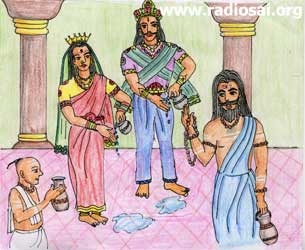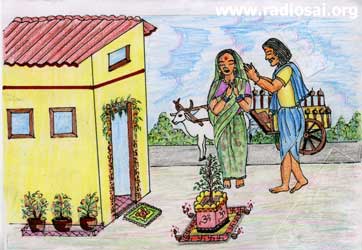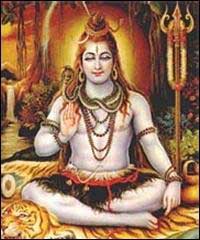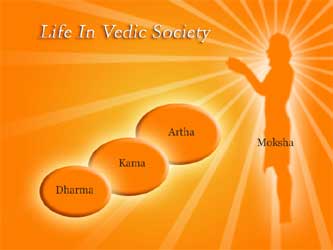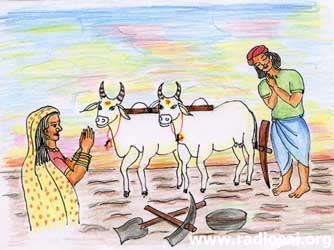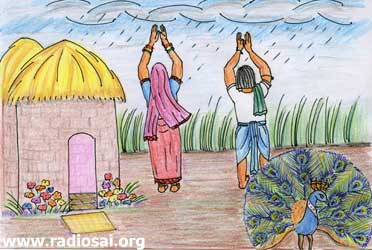 |
 |
 |
 |
| Volume 4 - Issue 08 AUGUST 2006 |
|
|
MUSINGS FROM PRASANTHI NILAYAM LIFE IN VEDIC TIMES – DIVINE VENERATION FOR EVERY OCCASION
Loving Sai Ram and greetings from Prashanti Nilayam. Introduction Last time, I gave you a glimpse of some of the rites associated with Vedic marriage. Marriage, I reminded you, was seen then as an act that related to the sustenance of Dharma and of humanity. In this venture, the husband and wife were joint stakeholders. This is an important concept and we should make some effort to absorb its essence. Today all such thinking might seem irrelevant and even nonsensical but the ancients had a different view of life and Society. Yes, if the emphasis is entirely on the individual and his so-called liberty to do as he or she pleases, then all these Vedic concepts would appear outdated. On the other hand, if we feel that humans must be in total harmony with their surroundings, then the Vedic concepts do acquire great importance. The Rig Veda sings the praise of a harmonious couple thus:
One unfortunate thing that has happened in recent times is that the modern generation’s view of the Vedas and Vedic customs has been shaped entirely by what happened subsequent to the early Vedic period. It was in that period that many aberrations crept in, masking the original intentions of the Vedic seers. Few realise that systems and organisations often start off splendidly but later suffer atrophy. This happens whenever people get cut off from the original objectives. Such degradation has happened repeatedly in history, in organisations, in social systems, and in governments; and it has happened all over the world. However, where people have been watchful, systems have retained their original character for extended periods of time.
Swami often talks about education for life rather than just living. In a sense, that is exactly what the Vedas offer. The thousands and thousands of hymns cater to all aspects of life, keeping in mind the centrality of God. Society can never be made up of just geniuses; ordinary people too are very much needed for the existence of Society, and without them Society just cannot function. And these ordinary people, by their very nature and outlook, cannot be expected to understand high philosophy. Yet, they do need a code of life suited to them but based on the highest principles. Thus it is there are Vedic prayers for everybody and for every occasion. Vedic Prayers for the Home Let us start with the home. The craving for a home has been there from time immemorial. In Vedic times, the home was seen as an extension of the body, rather than as something that was a property that belonged to a particular person. The home was considered to be the first real extension of man’s world. To take leave of the home was to take leave of the world. Thus it is that the ascetic who renounced the world left the home for ever as a symbolic gesture.
God is always the sole provider and Vedic seers made sure that ordinary people were continuously reminded of that through various prayers chanted on various occasions.
O mighty Power, the God who never slumbers, Prayers for a Regulated Life - The Purusharthas
One may seek wealth, but within the bounds of Dharma. Desires one might have but again within the bounds of Dharma. And if Dharma is made the beacon of life, then one can aspire for liberation from the recurring cycle of birth and death. The constant stress on Dharma is noteworthy. Scholars tell us that there really is no such thing as Hinduism in the sense one has say Judaism, Christianity, Islam etc. The word Hinduism in fact came into existence only after the advent of the British. What is popularly referred to as Hinduism is actually a way of life called Sanathana Dharma, meaning essentially Timeless and Eternal Dharma. Within a basic framework, Sanathana Dharma offered considerable flexibility. It is also noteworthy that while most religions have a founder, Sanathana Dharma has none. A Sacred Attitude to the Earth The importance of food for life and existence was fully recognised, and food was thus revered in the Vedic age as the gift of God. Not merely that. All aspects of human activity associated with the production of food were duly sanctified, and all agencies of Nature that assist in food production were duly revered. Here is a sample of the hymns chanted at the time of ploughing the field. The hymns are addressed to Kshetrapati, the Lord of the Field.
There is in many cultures a thanksgiving prayer after a bountiful harvest but the people of Vedic times, chanted a prayer even as they were ploughing. Invocation to the God of Rain Let me now turn to rain. If there were no rain, life on earth simply cannot exist. Rain was personified as the god Parjanya, and many are the verses sung in praise of Parjanya. He is adored, venerated and also feared. He can be gentle and also fearsome. He has to be propitiated appropriately because without him life is not possible. Here are some verses sung in his praise:
Rain is necessary no doubt, but too much rain can also be a problem. So, there is a special appeal when the downpour is excessive.
This is just one example from the vast collection that the Vedas represent. Every gift of God is respectfully acknowledged. Poets have written about rain and storm but one does not hear of thanksgiving to every aspect of Nature in this vein. I may be completely wrong but till today, I have not come across any adoration in any other culture that matches that which can be found in the Vedas. It is amazing that nothing auspicious or good was ever done without first propitiating the gods. Mercifully, at least some of these customs have survived to this day. When a child is born, there is a remembrance of the Lord and prayers addressed to Him. I have already made a reference to this in an earlier article [Click here to read that again]. There are similar expressions of gratitude at every stage in the child’s life, for example, when it is given a name, when it is given the first morsel of solid food, when it is taught the first alphabet, and so on. When a house is built, there is a ritual called Bhoomi Pooja at the time the ground is broken. Likewise, when the house is completed and is to be occupied, there is a similar ritual involving thanksgiving. So on it goes. Today’s sceptic might argue: “All this might have been OK in an age when we did not understand the forces of Nature, but they are clearly meaningless in today’s world.” This view stems basically from the negation of the Creator. Swami says, if there is a watch, there surely must have been a watchmaker. If a small thing like a watch needs a maker, does it not follow that the Universe too must have a Creator? Could it have popped from nowhere just like that? We see here a fundamental difference in the outlook of people of modern times as compared with people of the Vedic era. The modern outlook is largely analytic, where the whole is seen in terms of parts. The Vedic approach is just the opposite, being entirely holistic. Everything - man, Nature etc., is seen as an integrated whole, with God in the centre. God thus is not only central to everything but also most essential. Anything, or activity, without God was just inconceivable. Veneration to Breath Consider, for example, how breath was venerated. Breath, we all know, is synonymous with life, and life is a gift of God. Yet, where else can one find a celebration of breath except in the Vedas? Here are a few hymns in praise of breath:
Raimundo Panickkar, whose work, let me remind you, is what I am basing these talks on, says the phrase “You are indeed I”, is an echo of Upanishadic philosophy that the individual is in fact God. This is an important point. Life is God, and when Praana is equated with the Self, it means Self is God. Time – Verily God Let me next consider Time. St. Augustine says, “I know what Time is but cannot describe it.” A modern physicist would describe Time as one of the four dimensions of space-time. But for people of the Vedic age, Time was verily God. Here are a few verses in praise of Time.
Those were some verses from the Atharvana Veda. Now a couple more from the Maitri Upanishad, once again on Time:
With today’s scientific knowledge, we may pick holes here and there in the above verses, but no one can take away the fact that the ancients revered Time as God and also understood that Time itself was a creation of the Absolute God. Superstition, stupidity? So it would appear from today’s perspective but from the holistic point of view that dominated Vedic life, such adoration and acknowledgement represented the height of wisdom. Death and Rebirth I now come to death and the last journey. There are many Mantras and rites associated with death. Having evolved over centuries, they reflect the attitude at various times. Panickkar says that in the Vedic Mantras chanted during a funeral, there is no sign of grief. The hymns are markedly sober in tone. There is no regret, and death is seen as an event that unites the dead person with his forefathers. Here is a sample of such hymns:
The Sathapatha Brahmana too views death as a mere prelude to birth. It says:
The question might arise: these hymns seem to focus on rebirth whereas the highest Upanishadic truths direct attention to Immortality. That is a valid point, and may be I shall start my next article on that note. For the present, let me hope that I have, to some extent at least, managed to give you a broad brush overview of the Vedic heritage, guided by Panickkar’s monumental work. Jai Sai Ram.
– Heart2Heart Team |
|||||||||||||||||||||||||||||||||||||||||||||||||||||||
| You can write to us at : h2h@radiosai.org |
Vol 4 Issue 08 - AUGUST 2006
|
Best viewed in Internet Explorer - 1024 x 768 resolution. |
DHTML Menu by Milonic. |
